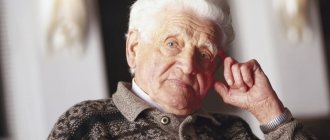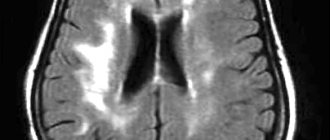From this article you will learn:
- Why does depression occur in older people and what are the risk factors?
- How does depression in older people differ from dementia?
- How to Diagnose and Treat Depression in Older Adults
- What are the consequences of depression in older people?
Old people... They are always dissatisfied, they grumble, you can’t please them. Sound familiar? But few people realize that our relatives simply need help. Depression in older people is not a condition of everyday life, but a mental illness, and the most common one today. One thing is good: she can be defeated, she will retreat with proper treatment. What can you do to prevent depression from affecting you or your elderly relatives and friends? What to do if signs of this disease appear? Could what we are seeing be depression? We hope our article will help you get an elderly person out of this state.
Why depression occurs in older people
“Not my day”, “a bad streak”, “I didn’t have a good morning”... There are many more excuses for the onset of depression. This is what psychologists began to call a long-term mental state of gloomy hopelessness. This mental disorder manifests itself in the loss of adequate perception of reality. Everything seems dreary, the mood is at zero. What used to make you happy is now annoying. You pushed your beloved dog away, were rude to your friends, you don’t want to move, everything is in black, pessimistic thoughts arise, crosswords, embroidery, violets on the window are abandoned, self-esteem is so low that you can only feel sorry for yourself. Some try to find solace in alcohol or other psychotropic substances.
What is associated with depression in adulthood? What pushes a person towards it?
- Let's start with the fact that older people react very painfully to everything. But this is not harmful, as many people think. What caused mild annoyance in youth can provoke depression and nervous breakdown in adulthood. Stress, severe fatigue, situations that cause various breakdowns greatly deplete the reserves of all body systems. He has difficulty adapting to stimuli. An elderly man has difficulty hearing, he has to constantly ask again, half of the words in a conversation pass him by. Finally, he begins to avoid communication and withdraws into himself.
- How will you feel if something constantly hurts or bothers you? Not fun, right? People of mature age, unfortunately, accumulate a lot of somatic pathologies. When visiting a doctor, an elderly person often hears: “What do you want? Age!". Illness, poor health, the attitude of doctors and others - all this can trigger the mechanism of depression. There are also pathologies in which older people are at increased risk. These are cerebrovascular diseases, diabetes mellitus, abnormalities in the thyroid gland, and arterial hypertension.
- Many people look forward to approaching retirement age with fear, but it is not physical weakness and illness that scares them. They are afraid of social isolation, since upon completion of their work activity the usual way of life changes sharply, and a feeling of unfitness and loss appears. It’s as if you fell out of a fast train at full speed and were left standing on an empty platform, watching the disappearing bright, noisy train. It was as if the illnesses were waiting and appeared immediately. Here, depression can overtake those who spent most of their lives at work or in their careers, and most often men. Elderly women adapt more easily to their new free status, finding themselves in dacha care, next to their grandchildren, and traveling.
- Another problem for older people is loneliness. Only recently in the evenings your place was noisy and crowded: work problems were discussed, children demanded care and attention, plans were made for the weekend with friends. But now the house is empty, the grown children have their own families and interests, and no one is waiting at work. Friends, also elderly people, are busy with their illnesses, remind of themselves less and less often, and some are no longer there at all. The social circle is narrowing, loneliness with gloomy thoughts is approaching. Elderly women endure this condition more difficult, since they are the center of the universe called “Family”. Single women, divorced or widowed, suffer from emotional emptiness.
- How tempting it can be to cure ailments with one pill! This opinion also exists in the treatment of depressive conditions. You feel sad - take the medicine, and now you are cheerful and full of strength. Such a dismissively easy solution to problems with depression only strengthens the disease. Taking medications, even as recommended by a doctor, can trigger another wave of distress. And even more dangerous is the use of antidepressants on the advice of grandmothers at the entrance or a neighbor in the country. Severe cases are known when treated with antihypertensive drugs (dicogsin, methyldop, beta blockers), corticosteroids (prednisolone), analgesics, and sleeping pills.
- Recommended articles to read:
- Social services for older people
- Diseases of old age
- Valuable tips on how to choose a boarding house
Reasons for development
The elderly suffer more often than the young. According to various sources, symptoms are observed in 15-30% of older people. The disorder is diagnosed three times more often in women than in men. Pathology is provoked by the following factors:
- Retirement. The rhythm of life is changing. The lack of need for planning and clear organization creates a feeling of unstructuredness, uselessness, and lack of demand. A person begins to worry about old times and missed opportunities.
- Change in family situation. Parents don't have to take care of children. The house is empty. There is no need to try and for no one. Despondency occurs, known as “empty nest syndrome.”
- Deterioration of health. More and more chronic diseases are appearing. Malaise becomes a frequent companion. The situation is aggravated by hormonal changes and the progression of external signs of aging.
- Loss of loved ones. Colleagues, friends, spouses die. Someone else's death makes you think about the proximity of your own end. Not only the end of life itself is frightening, but also the pain and helplessness that often accompany the final stage.
In addition, the person loses his status as a professional. Small pension payments cause financial difficulties. Grandparents feel superfluous, “shards of bygone times,” this is aggravated by negative statements from others and changes in social standards, to which older people find it difficult to adapt. The risk of depression in older age increases with the following factors:
- Vascular pathologies: atherosclerosis, aneurysms, vascular malformations, hypertension, transient cerebrovascular accidents, history of strokes, discirculatory encephalopathy.
- Brain lesions: Alzheimer's, Pick's and Parkinson's diseases and secondary parkinsonism of various etiologies.
- Oncological processes: pancreatic neoplasms, lung cancer, breast tumors.
- Endocrine diseases: hypothyroidism, hyperthyroidism, hyperfunction of the adrenal cortex.
- Metabolic disorders: lack of vitamins, increased calcium concentration.
- Taking certain medications: levodopa and methyldopa for parkinsonism, beta blockers for heart disease, painkillers for arthrosis and arthritis, tranquilizers, sleeping pills.
Depression in older people: who is first at risk?
Who is not at risk of depression, and who among mature people should think about:
- Elderly women. Men turned out to be stronger and more resistant to depressive disorders.
- Lonely people, because they sorely lack the attention of others and the care of loved ones.
- Alcohol abusers or those with experience of taking narcotic drugs.
- People who have suffered a serious illness or stressful situations, for example, a change of place of residence (they moved their old mother to the city, who had worked all her life in the countryside), who have lost relatives and friends.
- Having suicidal attempts.
- Sick elderly people. The focus is on hypertension, heart attack, diabetes. Such patients need to be given special attention.
- Those whose relatives suffered from depression of various types, or they themselves struggled with this disorder in the past.
- Elderly people with disabilities who have some visible defect.
If you have discovered the presence of at least one sign, then this is already a reason to think about it. If there are several of them, it is necessary to act so that your elderly relatives are not left without attention and care, alone in the face of a terrible disease.
Anxiety-depressive disorder
The combination of depressive symptoms and increased anxiety, which is often found among elderly patients, can significantly worsen the quality of life of the patient and his relatives.
Anxiety is an emotion that arises as a result of a subjective attitude towards any, real or fictitious, event. In fact, anxiety can be called a character quality characteristic of people of the older generation, who are accustomed to being afraid of “what might happen”, “what will people say?”, “so as not to be worse than others”... With age, anxiety only worsens, that is Older people are very susceptible to this type of depressive disorder. Just imagine the existence of an elderly person who is almost never relieved by causeless anxiety: he is constantly looking for and finding dangers that threaten him or his loved ones. At the same time, he is in a hopeless situation: anxiety provokes muscle and emotional tension, which, in turn, affects general well-being. Anxious-depressive patients have disturbed sleep, neuralgic pain, disruptions in the functioning of the cardiovascular system, autonomic disorders, and digestive disorders, which further aggravates their condition. In order to recover from anxiety-depressive disorder, an elderly person needs the help of specialists and loved ones.
How does depression in older people differ from dementia?
Externally, depression and dementia are very similar conditions, the main difference being that the first disease is reversible and therefore requires treatment. However, they can and should be able to be identified. Let's start with depression. It can affect memory, causing an elderly person to become absent-minded and lost in space.
Dementia (dementia) is a serious disease that affects the brain. By saying “of sound mind and sound memory,” we emphasize that it is absent. Indeed, for an elderly person it is important that with age, speech, attention, and the ability to accumulate, retain and reproduce existing knowledge and skills remain at the same level. Otherwise, his life will become very complicated: his habits will change (what he previously liked will cause disgust), his restrained character will become hot-tempered. Such people have difficulty caring for themselves and very often fall into depression.
Below is a table that gives a clear picture of the similarities and differences between dementia and depression (LJ Cohen, 1999).
| Parameters of mental state for which comparison occurs in parallel | Depression | Dementia |
| Affect (intense and short-term outburst of emotions) | Depressed (withdrawal). Deepening, soul-searching, escapism from reality. Severe subjective distress (destructive effect on the body). | With a violent manifestation. Labile, losing nuance (reacts sharply to both positive and negative stimuli). Lack of concern about one’s condition (a person does not care who he is or what he is). |
| Start | Fast, stormy. Can be precisely defined, contrasting. History of depression and other mental disorders (controlled). | Gradual, increasing. The temporary assessment is not defined, it moves from one state to another. The disorder was noted for the first time. |
| Flow | Short, repetitive. Rapid development of symptoms after the first case. | Long-term, gradual. Slow development with regression. |
| Behavior | Indifferent, does not respond to stimuli. Absolute passivity, so any action requires effort. Indifference to memory lapses. Refusal and loss of social contacts. Intensification of attacks in the evening and at night is not typical. There is no loss of cognitive function (memory, attention). | With a predominance of distractibility, preoccupation, head in the clouds. Fussiness, aimless performance of actions. The failure of memory is compensated by notes. Social contacts are preserved, but with changes. Attacks often worsen in the evening and at night. The behavior is comparable to the severity of cognitive dysfunction (memory loss, mental weakness). |
| Complaints | There are complaints of cognitive impairment | Complaints of cognitive disorders are often absent |
Depression in older people and its types
- If we are talking about congenital or acquired defects of the nervous system, then these are organic depressions.
- If the disorders are caused by traumatic events (problems at home, worries at work, loss of a loved one), then we are talking about psychogenic depression.
- If depression is detected in elderly people with diseases of the respiratory system, cardiovascular system, visual organs, or oncology, then it will undoubtedly be of a somatogenic nature. This type of mental disorder manifests itself especially often in medical institutions with long stays.
- Hereditary predisposition, internal pathogenic factors, with increased influence of external circumstances on them, give endogenous affective deviations ( bipolar and unipolar depressive disorders ).
- Long-term use of certain medications can lead to iatrogenic depression. There are opponents and supporters of this theory. In the same vein, we can talk about the body’s reactions to careless medical opinions.
Depression in older people and its signs
Depression in older people varies in symptoms. Older patients do not show emotional manifestations; they are often closed and withdrawn. Older people are more concerned about physical conditions, for example, fear of developing a disorder such as Alzheimer's disease.
Negative emotions, of course, do not disappear anywhere, but they look natural due to the lack of support and care of loved ones, disappointment in people, etc.
Let's try to understand the fears that are the main signs of approaching depression in older people:
- The difference between depression in a young person and an elderly person is that the latter lives in the past. If a void has formed around, then it is filled, most often, with negative memories, turning into a mental disorder that torments and torments the patient. The person replays the difficult situation over and over again, returning and multiplying anxiety and anxiety.
- Anxiety is an essential component of depression in older people. After comparing the research results, scientists confirmed this assumption. In the group of young people (under 35 years of age), only a third of those surveyed noted anxiety, and in the group of patients over 55 years of age, 70% confirmed the presence of anxiety, fears, and painful forebodings.
- It would seem that meeting the sun and the morning hours bring joy, but in the case of depression the opposite is true. The state of depression in elderly patients is especially noticeable in the morning and subsides towards evening.
- Depressed patients are characterized by slowness of movement and inhibited thinking. They are focused on themselves, on their inner feelings. It seems that these people are exploring their body from the inside, trying to figure out the problem of the origin of this or that pain.
- Indifference to the world around you, alternating with bouts of melancholy detachment are clear symptoms of a deep degree of depression.
Prevention of depression in old age
The best prevention of depression is the support of loved ones, which is combined with adequate drug therapy. After retirement, everyone needs help, even if they don't ask for it. Do not under any circumstances diminish the importance of your loved one. On the contrary, contact him more often with requests to share his experience, give advice, and communicate on any topic. This way you can show the retiree that others need him.
If there are children in the family and an older relative doesn’t mind being with them, then entrust him with some tasks. For example, help with lessons, educational games or something else. This is not selfishness if it happens voluntarily. Your grandchildren will become closer to your grandparents, you will have more free time, and an older person will not feel lonely.
People who have lost a spouse, child or friend need special attention. In this case, the likelihood of developing depression increases. Help and do not abandon elderly relatives. If you have chronic diseases, such as diabetes or heart problems, do not forget to monitor your health. An elderly person sometimes neglects to take medications. A program to prevent depression in a nursing home includes monitoring medication intake and other methods aimed at excluding mental disorders.
What are the clear symptoms of depression in older people?
What should we be wary of, what should we pay attention to?
- For a depressed elderly person, everything is bad: prices are rising, cars are only trying to splash mud, the rain is wet, the sun is hot. Constant criticism, irritation, dissatisfaction with oneself, with you, apathy - the patient will explain all these changes in mood reasonably, but will not even allow the thought of a possible pathology of his nervous system.
- Going somewhere or doing anything is problematic for an elderly person. A routine routine visit to the hospital causes a storm of indignation in a patient with signs of depression. Another symptom is decreased activity and loss of social contacts.
- He gets up at night, wanders around, reads magazines, falls asleep in the morning, frustrated all day. There is no appetite, even your favorite buns with a crispy crust are not delightful. Sleep disturbance and loss of appetite in an elderly person are the third sign of incipient depression.
- He has difficulty remembering why he has a pencil and notepad in his hand, why he took a calendar, and does not go to the store without a list of two products. Of course, this can happen to anyone, and perhaps an older person only has senile dementia, but it is also a symptom of a mental disorder.
- During periods of depression, older people most often complain of feeling unwell. About 90% of all patients showed signs of deteriorating health.
- Even from a closet full of clothes, you will not be able to throw out a single torn sock. You will hear that you are taking away the most necessary things from an old sick person, leaving him in poverty. The acquisition of new useful things also causes indignation and indignation: why buy an electric kettle if you can get by just fine with a jar with a boiler? Pathological hoarding is another sign of depression in older people. But it should not be confused with reasonable frugality.
- They opened the window - you want to catch a cold, they closed it - it made it stuffy, they asked what should be done - they blamed everything on him, they didn’t ask - no one is interested in his opinion. This is not harmful or a test of your nerves. This is a conversation, attracting attention, an opportunity to spend more time with you. Accusations from an elderly person against their loved ones is a rather acute and conflicting problem. Here you need to be patient, because it is unknown how depression will treat you and how lenient your family will be.
How is depression diagnosed in older people?
Reading these lines, many older people will confidently say: “This is not my case” - and they will be right. Diagnosing depression is very difficult. It appears and disappears again. Doctors cannot determine the presence of this disease using tests; they will only show the physical condition of your body. Therefore, to diagnose depression in older people, a simple but at the same time effective method is used - conversation, conversation.
A specialist determines the presence of pathology using several methods:
- Hospital Anxiety and Depression Scale.
- Beck scale.
For self-assessment, you can use the Zung scale. Tables using this method are filled out by the patient himself, which confirms the accuracy and subjectivity of the results. An elderly person with signs of depression needs to honestly answer questions about the frequency of anxiety, obsessive, difficult thoughts, appearance, and favorite activities. These are simple multiple-choice questions, the sum of which provides an explanation of the condition.
If the severity of the disease requires treatment and monitoring, doctors use the Hamilton Depression Rating Scale (HDRS) and the Manngomery-Asberg Rating Scale (MADRS).
Diagnostics
Depression in an elderly person is diagnosed based on a conversation with a specialist and test results. There are fairly reliable tests that can confirm the presence of this pathology, but their interpretation must be carried out by a psychotherapist or psychiatrist. The main diagnostic criteria for depressive disorder are:
- persistent depression of mood that occurs daily for 2 or more weeks and persists for a significant part of the day;
- loss of the ability to rejoice, have fun, or be interested in something;
- decreased energy level, apathy, increased fatigue.
Additional criteria include decreased self-esteem, a tendency to self-reproach, excessive feelings of guilt, difficulty trying to concentrate, indecisiveness, and constant doubts. The possible presence of pathology is also indicated by thoughts of death, suicidal intentions, signs of mental retardation or anxious agitation.
Severe depression is diagnosed when 3 main and 5 or more additional signs are identified. A mild or moderately severe disorder is indicated by 2 main, 3 or more additional criteria. When making a diagnosis, the age characteristics of the patient and the high frequency of clinically erased forms in the elderly are taken into account.
To exclude other health problems, the patient may need consultations with a therapist, neurologist, cardiologist, or endocrinologist. If signs of somatic diseases are detected, the patient may be prescribed an ultrasound, MRI, laboratory tests and other additional studies.
Depression in older people – treatment is possible!
Alleviating the course of the disease in a patient with depression and direct therapy is a rather complex process. Why? Because an elderly patient rarely agrees to admit his diagnosis, but if the pathology is not treated, it will break the person both morally and physically. As a rule, older people are afraid of being branded abnormal and being isolated. Success is possible if a trusting relationship has developed with the doctor, and the patient longs for recovery and is ready to follow all the doctor’s instructions for this purpose. Treatment consists of three components: replacing your lifestyle with a healthy one, medications, and working with a psychotherapist. Many people also add traditional methods here. More about all this below.
Treatment with traditional methods
Some people trust natural herbs, infusions, and decoctions more than synthesized drugs. Of course, folk remedies do not give side effects and are not addictive, but before using them you should definitely consult a doctor. This is very important when treating elderly patients.
Here are the most popular recipes :
St. John's wort for depression
St. John's wort is an excellent natural antidepressant. Infuse 20 grams of St. John's wort and the same amount of dried oregano into alcohol (250 ml). Add coriander seeds and thyme. After two weeks, take the tincture out of a cool, dark place and strain. We begin to take a drop a day, gradually increasing the dose to a teaspoon, washed down with water.
Calming infusion of mint and lemon balm
You need to mix two types of herbs. Then you need to take a tablespoon of their mixture and pour a glass of boiling water. Let cool and brew. We drink the resulting broth in the morning, afternoon and evening, dividing this glass into three parts.
Motherwort and valerian
These folk remedies are considered leaders in relieving nervous tension. Motherwort and valerian are sold in every pharmacy. The dosage is indicated on the packaging.
St. John's wort, rosemary, lemon balm and blueberry
Four types of grass are taken in equal parts. One tablespoon of this entire mixture is poured with boiling water and brewed for half an hour in a glass. After which the infusion is drunk with honey, like tea.
In addition, decoctions of chamomile, fennel flowers, anise, and lavender have a good calming effect. They can also be purchased at the pharmacy. Brew and drink like tea.
Medications for depression in older people
It’s great if depression has subsided after using folk remedies, but sometimes the use of medications is required. Modern antidepressant complexes are at your service here. These are long-familiar tricyclic and tetracyclic drugs. Improved antidepressants that block side effects have also appeared on the market - selective serotonin reuptake inhibitors and reversible MAO-A inhibitors.
Effective drugs help overcome the disease, but when prescribing them, it is worth taking into account the individual characteristics of each patient. The correct dosage and compatibility with other dosage forms are more than important when treating an elderly person.
The most popular antidepressants for older people today are:
- Atarax . This antidepressant is good because it is not addictive or dependent. It is effective for anxiety disorders that occur against the background of neurological and mental illnesses. Supports the functioning of the nervous system.
- Leviron. One of the safest drugs for elderly patients. Why? Because it provides a pronounced sedative effect. Can be used for all types of depression.
- Melipramine is prescribed to increase the mental and general tone of the body, motor activity and mood. Indications are depression, accompanied by apathy, melancholy, sleep and appetite disorders.
- Tsipramil is suitable for use in the presence of concomitant somatic diseases, suitable for long-term use, and has sedative and antidepressant effects.
But that is not all. Sometimes doctors prescribe nootropics, antihypertensives and antispasmodics that block panic attacks and unreasonable anxiety.
Another fact confirming the need for therapy under the supervision of a doctor is that, to be on the safe side and out of habit, elderly patients often take Corvalol or Valocordin before bed, which should not be done. These drugs not only interfere with the action of antidepressants, but can also cause a deterioration in well-being.
Psychotherapy
Only in films do we see how a psychotherapist accepts a patient and helps him get out of the crisis. In real life, older people are categorically against such treatment methods, but, having yielded to the persuasion of their relatives, many of them are convinced of the effectiveness of the practical help of a specialist. The consequences of depression are successfully corrected through a whole complex of cognitive-behavioural, interpersonal and family psychotherapy for elderly patients.
Electroconvulsive therapy
What to do when time is lost and neither medications nor a psychotherapist help? Depression destroys an elderly person, there is a threat to life, have there been any suicide attempts? Electroconvulsive therapy, otherwise called electroconvulsive therapy, is a method of psychiatric and neurological therapy in which, in order to achieve a therapeutic effect, an electric current is passed through the patient's brain, which causes a seizure.
Electroconvulsive therapy for the treatment of nervous disorders has been around for a long time. She has been saving the lives of elderly patients with severe depression for more than 70 years. This method of biological stress remains one of the most relevant means and is a worthy alternative to psychopharmacotherapy.
How to help an elderly person get out of depression
Only the comfort and warmth of home will help an elderly person overcome his illness. The attention of the whole family and care, words of gratitude and praise for help in housekeeping are priceless in the treatment of this serious illness. The patient must constantly feel the care and support of adult children and grandchildren, his importance and necessity for people dear to him. Old age can be a joyful period in a person’s life if he sees his importance and feels love from relatives.
Older people need constant encouragement. There is nothing warmer than words like these: “You did some difficult exercises today!”, “What beautiful embroidery!”, “Can I sit next to you and watch?”, “How does this blouse suit you, you look 10 years younger!” Sincere interest in their past has a very beneficial effect on patients. You will discover many amazing facts from your family history. Ask the older person to tell about his relatives, childhood, places where he lived in his youth, past work, interests. You will be amazed at what an amazing, heroic and at the same time humble person lives in the next apartment. Your admiring glance and shown interest can create a miracle. It is very good to look together at old photographs of the places where a person was born, lived, and worked, especially those in which he is depicted in strength, while performing socially significant work. This always improves self-esteem. At the same time, older people must feel your interest.
Prevention is better than cure!
When a person is already depressed, it is quite difficult to find the motivation to do anything. But even small steps taken to stay healthy can make a big difference in reducing symptoms of depression.
Exercises
Research shows that exercise can be as effective as antidepressants. Take a short walk or do some light housework and see how much you feel better.
Even if an older person is sick or disabled, there are many safe exercises they can do to improve their mood—even while sitting in a chair or wheelchair.
Diet
You need to start by minimizing sugar and refined carbohydrates and instead focus on quality protein, complex carbohydrates and healthy fats.
You shouldn't go too long without eating, it will worsen the mood and make the older person tired and irritable, so do your best to eat at least every 3-4 hours.
Quality sleep
Many older adults struggle with sleep problems, especially insomnia. Normal sleep duration is somewhere between 7-9 hours. To get better sleep, you should avoid alcohol and caffeine, go to bed at the same time every night, and keep your bedroom dark, quiet, and cool.
Day walks
Sunlight will increase serotonin levels, improve your mood, and combat seasonal affective disorder. If possible, an older person should go outside during the day and walk for at least 15 minutes.
Communication
It's never too late to build new friendships! Convince your elderly relative to join a group of people with similar interests. This could be a book club, chess club, etc. To overcome depression and stop it from returning, it is important to continue to feel involved and enjoy a new purpose in life.
One solution to problems with lack of communication is a private nursing home for older people: interaction with others facing the same daily problems will reduce feelings of loneliness.
For questions about accommodation in the private boarding house “Blago” in Khabarovsk, please call
Depression in older people and its consequences
Not treating depression in older people is inviting disaster. This pathology significantly shortens the patient’s life and can lead to heart attack, coronary heart disease and other cardiovascular diseases. Depression can trigger type II diabetes. Such patients poorly comply with the treatment regimen for the underlying disease and do not maintain close contact with the doctor. Elderly people do not enjoy the new day, they are increasingly visited by thoughts about the end of life, and they find it difficult to concentrate. If depression is left without treatment, relationships with loved ones will deteriorate due to the patient’s increased anxiety. Due to frequent scandals, misunderstandings of the problem, reproaches and worries, it will be bad for both him and his family. In an elderly person, feelings of guilt and loneliness worsen, suicidal thoughts appear, and a desire to rid loved ones of oneself as a burden appears.
Signs of Depression
At the initial stage, there is a sharp change in mood. The patient loses his appetite, develops insomnia, and develops a panicky feeling of fear or approaching death. This occurs due to a strong emotional shift, perhaps influenced by another psychological disease characteristic of older people, namely, insanity.
One way or another, after the primary signs, various forms of depressive delirium develop - condemnation, punishment, death, or suicidal tendencies appear.
An indicative emotional state appears. The patient shows all experienced emotions visually. If he experiences fear, his hands tremble and he sweats profusely. Almost a similar situation with worry, or despair.
Sometimes motor numbness appears. In other words, an elderly person is very constrained in his movements. This is mainly due to a loss of control over one's own emotions and feelings. Unreasonable panic fear may develop, self-judgment may suddenly begin, or other manifestations that are not characteristic of a person.
We can conclude that depression manifests itself not only in the psyche, but also has a direct impact on the patient’s physiology.











